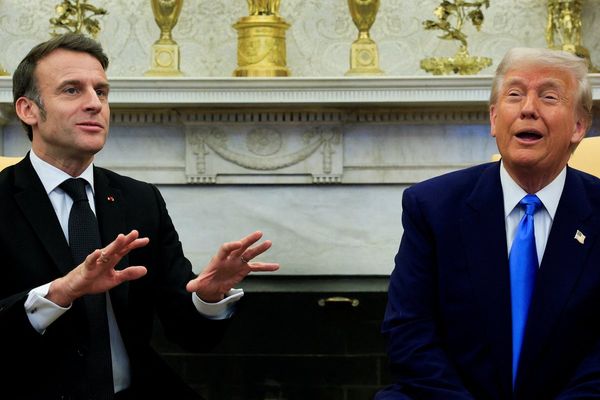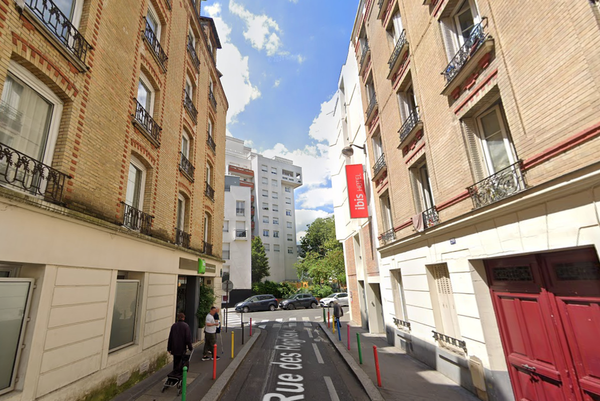
Kyiv, Ukraine – On March 20, in a park in the German city of Dusseldorf, three women holding a wind-blown yellow-and-blue Ukrainian flag sang a chant ritually performed on the day of the spring equinox that ended with an optimistic: “Sun, come out! Come out!”
The Ukrainian women – now twice uprooted by war – make up half of Dyvyna (Miracle), a female ensemble from Donetsk, a city in eastern Ukraine that was captured by pro-Russian separatists in 2014 in a war that killed more than 13,000 people.
Since then, Russian President Vladimir Putin has accused the pro-Western government in Kyiv of “violating” the rights of the Russian-speaking population of Donetsk and neighbouring Luhansk regions, collectively known as the Donbas.
Putin partly justified the full invasion of Ukraine, launched on February 24, as a move to defend the Russian speakers in this region.
“There are four million people there who want to think in Russian and speak Russian,” Sergey Naryshkin, head of the Russian Foreign Intelligence Service and Putin’s former colleague in the Soviet KGB, said in February.
But Dyvyna’s repertoire of some 300 Ukrainian folk songs from Donetsk serves as an artistic response to the Kremlin’s claims that the entire region is exclusively Russian-speaking.
“The myth about Russian-speaking Donetsk has little to do with reality, it was created by Russian propaganda and pro-Russian Ukrainian politicians,” Kyiv-based music critic Lyubov Morozova told Al Jazeera.
She said that Dyvyna’s first show in Kyiv in 2014 was a “culture shock” for many in the audience.
“Ukrainian-language folklore and embroidered shirts are not associated with the land of coal and salt,” as Donbas is known.
Dyvyna’s folk songs are performed in their original language – Ukrainian – after scrupulous documentation of where they had been sung for centuries, in the villages around Donetsk.
While similar ensembles have performed Donetsk folklore, they have disbanded because of the war.
In the Soviet era, Donetsk underwent rapid industrialisation, as dozens of metallurgical, chemical and power plants were built in the region, which is rich in coal and iron ire. Moscow encouraged hundreds of thousands of people from across the Soviet Union to move to Donbas.
The above video shows one of Dyvyna’s performances
“The [region’s] urban population is Russian-speaking, and to some extent, they’ve been Russified forcibly,” Dyvyna’s founder and former creative director Olena Tyurikova told Al Jazeera. “But Ukrainian speakers dominate the villages.”
For decades, the ethnomusicologist collected folk songs from Donetsk – and ran a children’s choir that performed some of them. In 1998, some of the children who entered the Donetsk State University formed Dyvyna, whose ever-rotating cast includes up to 11 members.
To some, Dyvyna’s songs may sound harsh in comparison with the canons of European classical music.

“We are loud, we’re more throaty. We have rich polyphony, plenty of subvocalisation,” said 32-year-old Serafima Sokolvak, the only remaining original member of Dyvyna who started singing in Tyurikova’s children’s choir at age six.
“And each song is a little drama,” Sokolvak, now also a music teacher and the head of a children’s choir, told Al Jazeera during a rehearsal in a small rented apartment in eastern Kyiv, shortly before Russia launched its invasion of Ukraine.
Critics say Dyvyna’s sound has evolved.
“They started singing much better than before. This is good quality for a folklore ensemble,” Kyiv-based music critic Iryna Klymenko told Al Jazeera.
Each performance is also theatrical, with the Dyvyna singers donning the traditional attire of Donetsk women – elaborately embroidered shirts and skirts, aprons, headscarves and necklaces made of blood-red coral beads or pearls.
In Donetsk, they were a local act and struggled financially. In 2013, they had to busk to collect enough money to go to a folk music festival in Russia, where they won a second prize – something that hardly seems possible any more.
From Donetsk to Kyiv, and elsewhere
In recent years, as the atmosphere in Donetsk turned hostile, the group relocated to Kyiv.
In early 2014, months-long protests on Kyiv’s Maidan Square toppled President Viktor Yanukovych, a pro-Kremlin native of Donetsk.
The Kremlin soon occupied and annexed Crimea and organised “anti-Maidan” rallies in Russian-speaking Ukrainian regions, which morphed into an armed rebellion in Donbas.
After what turned out to be Dyvyna’s last rehearsal in Donetsk in July 2014, the members walked home together late at night singing – and encountered gun-toting, Russia-backed separatists.
The rebels carved out what they call two “people’s republics” in Donetsk and Luhansk that fully depend on Moscow’s political and financial support.
Putin has denied backing the rebels but has pledged to “defend” the rights of ethnic Russian and Russian-speaking Ukrainians.
Millions fled Donbas, and the region is still divided politically and linguistically.
“The division split families,” said 37-year-old Svitlana Medviedeva, who is one of the three members now in Germany, having fled Russia’s latest invasion.
She has barely spoken to her pro-Putin father since he said in 2014 that the Euromaidan protesters should be “finished off”.
The choir also almost broke apart as the conflict impacted logistics.
But on August 24, 2014, Ukraine’s independence day, Sokolvak and Yulia Kulinenko, who had been with Dyvyna since 2004, bumped into each other on the Maidan Square and spontaneously burst into song.
They decided to reunite the ensemble – and one of their first performances was a triumph.
“By the end of the show, the audience gave us a standing ovation,” Kulinenko said. “That’s when I understood we have to go on.”
Before 2014, they performed on television and radio and took part in shows with hundreds, sometimes thousands, of listeners. Yet they cannot afford to go professional full time or record an album in a studio.
“We all dream about it,” said Sokolvak.
Dyvyna’s relocation to the capital made the group far more visible, they performed at dozens of festivals and were often seen on national television.
“You can’t even compare the opportunities in Donetsk and Kyiv,” Hanna Zubkova, who joined in 2003, told Al Jazeera.
But as their fame grew, they had to be mindful of their security and the safety of their relatives still in Donetsk.
Kulinenko said that a former friend with ties to separatists threatened her over her political views, saying she would be imprisoned in one of Donetsk’s infamous concentration camps, known as “basements”, where dissidents are jailed and tortured without trial for months.
As day jobs, studies, families and in some cases distance kept them apart on weekdays, Dyvyna only rehearsed on weekends, singing in a kitchen or a living room.
Then, the latest Russian invasion tore them apart again.
Two members remain in Kyiv. One is in central Ukraine. The three who ended up in Germany performed the spring chant in Dusseldorf.
“I don’t understand at all in what dimension I am, like I am in transit everywhere,” Medviedeva said.
However, their second exodus has a silver lining, as their presence in Germany gives them a chance to perform to Western European audiences.
“Our schedule is pretty tight. We have a new girl, we are working on a new repertoire,” Kulinenko said. “We don’t have much time to sleep.”







